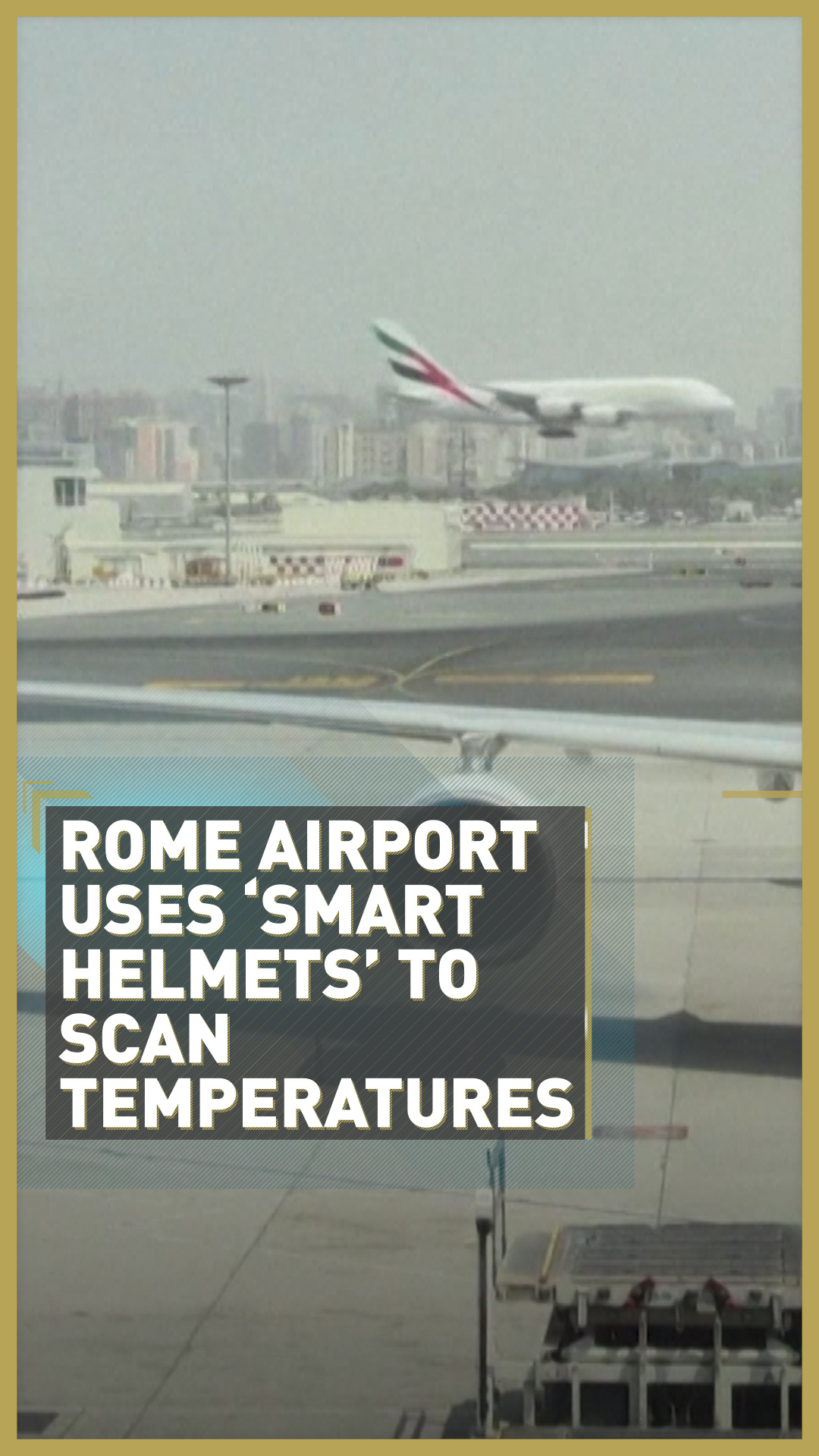01:47

Italy's busiest airport, Rome Fiumicino, has become the first in Europe to use "smart helmets" equipped with thermo-scanners to check for symptoms of COVID-19.
The augmented reality helmets are hooked up to a camera and a thermos-canner that can measure body temperature from up to seven meters away, producing a scan of the passenger's body heat, which is then transmitted to its visor in real-time.
This allows staff to see the full body scan right in front of their eyes and stop passengers with a fever above a certain threshold level, helping to reduce the spread of the new coronavirus.

Created by Chinese and Italian companies, the 'smart helmets' are already being used in Asia, but these are the first of their kind to be used in European airports. /Remo Casilli /Reuters
Created by Chinese and Italian companies, the 'smart helmets' are already being used in Asia, but these are the first of their kind to be used in European airports. /Remo Casilli /Reuters
The smart helmet is a "combination of a thermal camera and augmented reality screen," says Ivan Bassato, management director for Rome's airports, allowing the employees "to cover a wide area within the airport and make full synergies with fixed thermo-scanning devices."
"Thermo-scanning is a proof technology that is very handy in monitoring high, large, big flows of people and passengers," he adds.
"It's a control here that we have in place to ensure that passengers with symptoms, with fever above a certain threshold, are kept outside the airport environment."
The portable technology has given the airport a new edge, but there are already 83 static thermo-scanning positions in operation at the airport," by far the largest location in terms of deployment of this kind of technology," according to Bassato.
The new helmets are "just one piece of the very vast plane of measures that we have in place to ensure that this environment stay safe."

At Rome Fiumicino alone, passenger numbers are down by more than 95%. /Remo Casilli / Reuters
At Rome Fiumicino alone, passenger numbers are down by more than 95%. /Remo Casilli / Reuters
Created by Chinese and Italian companies, the helmets are already being used in Asia, but these are the first of their kind to be used in European airports.
So far, the airport is employing three of the models but Bassato hopes to increase the number to five in the near future as passengers gradually begin to start traveling through Italy again.
"I think that we are a reference or a benchmark for many procedures and technologies that were applied for the first time here in this airport as part of the plan to fight against the pandemic, but also as part of the best practice for managing airports," says Bassato.
"We are really receiving a lot of inquiries from outside, not only from Italy, because many people in the industry and outside the industry see the benefits of having such device introduced in the airport operations. So I imagine that it will become more and more popular."
Airports have been turning to new tech to help make air travel safer amid COVID-19 as the global aviation industry has taken a big hit since the outbreak of the pandemic, with many airline companies laying off swathes of workers.
At Rome Fiumicino alone, passengers are down by more than 95 percent compared with the same period last year, with the airport closing Terminal 1 in March and massively downsizing their boarding areas.
The helmets may offer some hope of reviving confidence in air travel inside Europe, but with the COVID-19 crisis set to continue until a vaccine is found, airports and airline companies may have to look further afield than new technology to save their industry.
Check out The Pandemic Playbook, CGTN Europe's major investigation into the lessons learnt from COVID-19.
FROM OUR GLOBAL COLLEAGUES
- Brazil hits new daily record for novel coronavirus cases, deaths
- Kenya, Uganda latest to receive IMF help against pandemic
- COVID-19 Global Roundup: Latest pandemic measures
CGTN Europe has been providing in-depth coverage of the novel coronavirus story as it has unfolded. Here you can read the essential information about the crisis.
Source(s): Reuters